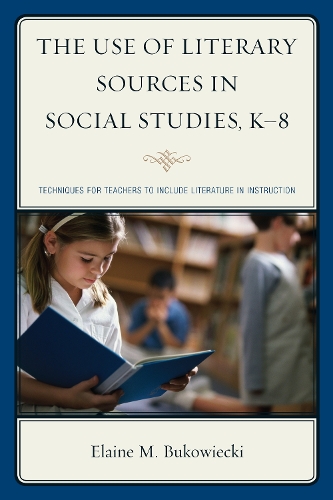
The Use of Literary Sources in Social Studies, K-8: Techniques for Teachers to Include Literature in Instruction
(Paperback)
Publishing Details
The Use of Literary Sources in Social Studies, K-8: Techniques for Teachers to Include Literature in Instruction
By (Author) Elaine M. Bukowiecki
Bloomsbury Publishing PLC
Rowman & Littlefield Education
18th March 2014
United States
Classifications
Professional and Scholarly
Non Fiction
Educational: Citizenship and social education
372.89
Physical Properties
Paperback
216
Width 153mm, Height 228mm, Spine 15mm
322g
Description
The Use of Literary Sources in Social Studies, K-8 is a resource for teachers who wish to include varied literary genres in their social studies instruction along with a required social studies textbook. The literature described and exemplified in this book includes fiction, nonfiction, biographies, autobiographies, historical fiction, poetry, fairy tales, folktales, tall tales, and legends. Throughout this book, different instructional suggestions are presented for inclusion with varied social studies topics and literature sources.
Each chapter contains questions and pedagogical strategies for critically reading and responding to varied literary genres, modifications to meet the needs of diverse learners, assessment techniques, information tied to technology and the new literacies, and connections to the National Curriculum Standards for the Social Studies: A Framework for Teaching, Learning, and Assessment (2010) and the Common Core State Standards for English Language Arts and Literacy in History/Social studies, Science, and Technical Subjects (2010). The final chapter of this book describes the development and implementation of a classroom library for social studies teaching and learning.
Reviews
It is rather difficult to think about text material without the inclusion of common core standards of reading, writing, speaking, listening, and language. This book is another instructional intervention designed to positively impact student performance. The following questions, among others, are ably answered in this wonderfully laid-out, practical text, which is designed to help teachers move the teaching of social studies to another level. What criteria are utilized to select literature types for use in social studies classes How are lessons modified to meet the needs of diverse learners How important is prior knowledge regarding social studies topics What are some guidelines to employ to help students in a social studies class comprehend and respond to text material Why is assessment important and necessary Is there a need for reflections If so, when/how should they be incorporated For teachers who would like to help children become lovers of social studies, the author describes literature sources and literacy techniques that can be used for varied social studies. Additionally, each chapter contains a summary, reflective questions for teachers, topics of discussion for college/university classrooms, and references. Summing Up: Recommended. Upper-division undergraduate, graduate, research, and professional collections. * Choice Reviews *
The author has clearly presented her conceptual framework. It was very easy for me to understand her perspective and to predict what I would be reading in the text. I appreciate the organization of the text; in many ways it is parallel to how I teach my elementary methods course. -- Cheryl Mason Bolick, associate professor, University of North Carolina at Chapel Hill
This work is very accessible to students. It is clearly written, avoids jargon, and provides opportunities for students to experience concepts several times, in several ways. The case studies and literature listings are very student-friendly. -- Dr. Christopher S. Boe, associate professor and director of graduate programs in teacher education, Pfeiffer University
The format is very digestible for students as well as teachers. I can imagine assigning sections of chapters that are, in themselves, easy for students to comprehend individually. These segments might then be joined with others to give students a grasp of the entire chapter. Additionally, these small pieces could also stand alone. Given the sometimes limited amount of instructional time in the classroom, the advantage for this text lies in it accessibility at a variety of levels. -- Richard K. Gordon, professor of teacher education, California State University, Dominquez Hills
Author Bio
Dr. Elaine M. Bukowiecki is a professor of literary education at Bridgewater State University, Bridgewater, Massachusetts, where she coordinates the Graduate Programs in Reading. Elaine is a former Massachusetts elementary-school classroom teacher and a Connecticut district-wide language arts coordinator.
